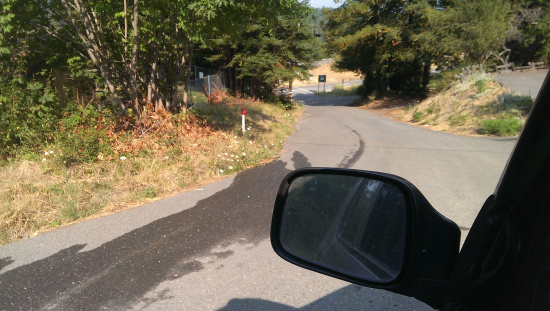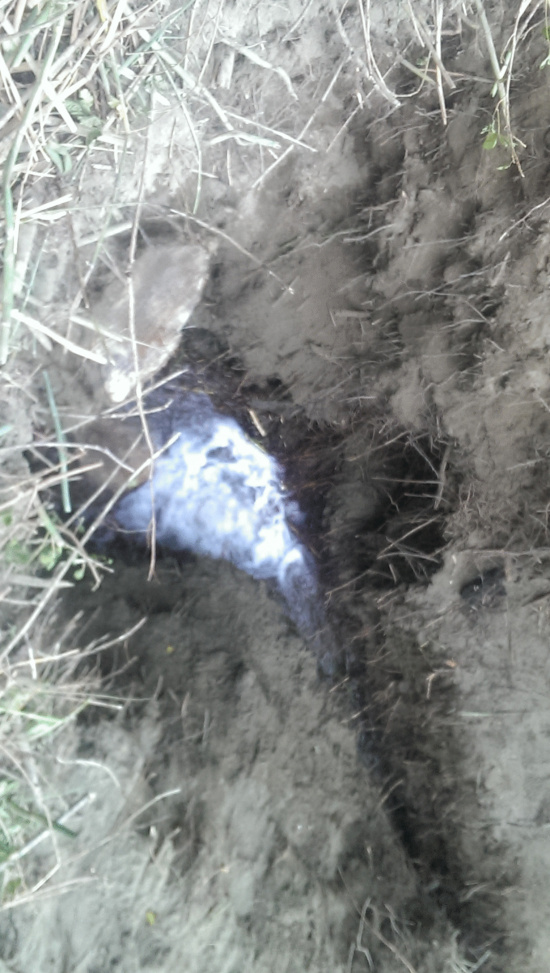
Circumstances around bulk water sales and incidents of bulk water theft have led to strain on the water systems of some of Humboldt’s smaller communities, and since there are a lot of marijuana crops that need a lot of water, some people are blaming growers for the aquatic funny business. This summer’s bulk water debacle came to a head this month in Weott. It’s a domino effect kinda deal, and domino number one is Garberville.
Toward the end of last year, a citizen complaint triggered the State Water Resources Control Board to issue a Cease and Desist Order (CDO) to the Garberville Sanitary District on bulk sale and delivery of water outside its authorized place of use (essentially Garberville proper). GSD was allegedly selling bulk water to commercial water delivery companies that re-sell the water to customers outside their licensed and permitted place of use. That is not allowed.
People can still obtain bulk water from Garberville for “emergency domestic use” — this does not cover marijuana gardens. With Garb out of the bulk water sales game, bulk water demand hit Myers Flat. And by mid-July, that demand became to much to bear for the small community’s aging water infrastructure.
At its July 13th board meeting, the Myers Flat Mutual Water System suspended bulk water sales. The strain from the sales and suspected theft of bulk water was causing low pressure and excess sediment in the system. Plus, the group’s attorney revealed at the meeting, Myers Flat Mutual Water System bylaws state that water from Myers Flat must stay in Myers Flat.
The residents were upset by the strain on the system and from the shady business they were seeing around town. From Redwood Times coverage:
“During public comment there were numerous anecdotes of water trucks filling up from local fire hydrants at odd hours sometimes in the middle of the night. This activity reportedly continued right up until the morning of the meeting.”
Enter Weott.
On July 21, the Weott Community Services District folks discovered that one of the town’s water storage tanks was about 10,000 gallons short. A fire hydrant had been opened during the night — water was stolen. The very next day, someone jacked another 10,000 gallons of water from the Weott system. Redwood Times coverage here.)

Weott fire hydrant with puddle from the water theft. Courtesy Hank Brenard.
To replace the stolen water, the Weott CSD pushed more water through its filters than is normally allowed (a move approved by the state Department of Health). This action strained their infrastructure to its breaking point — leaks started popping up all throughout the system. One leak in a major line resulted in a significant silting of the Eel River.
Total clusterfuck. State of emergency. Literally. And in the aftermath, both the Weott CSD Board Director Lou Iglesias and its Operations Manager Hank Brenard threw blame at pot growers. (See quotes from Iglesias hereand check out Aug. 6 KMUD News coverage for remarks from Brenard.

The leak in this pipe in the Weott system is the size of a pencil. Water is gushing out at 50 gpm at 300 psi. Courtesy of Hank Brenard.
I spoke with Brenard this week about why he thinks growers are to blame for the water theft. His reasoning is that growers use bulk water as opposed to water from their own diversions because “if you were to get caught pulling water out of the creek without a permit, the consequences are huge.” (Recall LoCO-OTP: The SoHum Water Debacle — the bulk of rural landowners in Humboldt County have unpermitted water diversions.)
According to Brenard, growers are “trying to keep the mystique of being a marijuana grower and trying to stay off the grid.” He adds “If you’re going to grow marijuana, grow marijuana. Everybody knows you’re doing it, and nobody cares… If people actually followed the rules, did all the environmental permitting… it’d probably cost them about as much as their first load of soil.”
He says that it’s ridiculous that people “go the point where they take water from people, from their homes. Those people in Weott, that’s the water for their homes and for their fire protection. They built that system, they paid for that system. And it’s not just Weott — it’s Myers Flat, Redway, Redcrest — they all get water stolen from them.”
For the eco-perspective, I spoke with Scott Greacen, executive director of Friends of the Eel River. He says that the water crisis is something that residents in the North Coast haven’t really had to confront yet — the area is undergoing a sea change at this level. People are starting to understand that a critical aspect of a property’s value is it’s access to water and that there are a number of ways to secure water rights.
As for growers, Greacen says “that the return on investment in the weed industry, is incredibly high, but it’s high because it’s risky business.” Sure the CHP might pull you over in Laytonville and take everything you’ve worked for, but growing weed is also risky “because you’re banking on stuff you didn’t pay for” like access to water and the general willingness of the community to look the other way.
“There’s a lot of stuff I think that people don’t really calculate as part of their bottom line, whether it’s early frost or a bad mold year — there’s risk. And a really, really dry year, well, yeah, that’s a big risk. This is why a lot of us have been talking about water storage for a long time now.”
He advises, when you set out to do something in this region, you have to be aware that it’s not going to rain for many months. “I’m really losing sympathy with people who don’t have any water in August — people who have plants that need a lot of water in August and September.”
Human diversions are not the whole problem: “Our landscape impact set the stage for this low flow crisis… We have much lower flows now than we would have had we left our forest intact and still had this terrible low rain year.”
“But the question of human diversions has everything to do with, what are we doing with what’s left? There’s just no question that the fish have a prior claim and a higher right… Whether [people] got here 40 years ago or 20 years ago or two years ago or last month, if they think that their right to make money is more important than Coho survival, well, I really disagree and we’ve got a problem.”
Over the course of the next few years, Greacen has to “prepare for and then execute some kind of a plan to wrest our water back from the Russian River interests …”
“If I sit down to deal with the wine interests of Potter Valley and the larger Russian River and say ‘We need our water back, it’s critical for our salmon, to really restore and protect our steelhead and our salmon…’, they’re going to look at me and say ‘You’re out of your mind. You want your water back for more pot growers who refuse to even get water rights and dewater the watershed and kill the fish you claim to care about.’”
He needs to be able to show that “we as a community have tried to do our best to protect the fish, not just to comply with the law, but actually to do the right thing.” Doing the right thing means going above and beyond the law to store and live off winter water as so many people already do in this region.
“We are up against both a highly organized and very wealthy, very politically powerful wine industry that really understands political power, and we’re also trying to deal with the pot industry that can’t seem to get its act together.”
He says growers need clear spokespeople who say “Hey, we’re trying to be responsible, we are doing our best, we are good stewards — make it possible for us to do the right thing,” and that the Emerald Growers Association is starting to move in to this role.
He also advises self-policing: “The responsible parts of the industry have to demand accountability not just from the neighbors, but from the whole system — the county government, state agencies…” For growers, that means registering their water diversions and accepting the fact that regulation is needed — “regulation that people would rather not have, I’m sure… But when the choice is no regulation on the bad guys, I think the utilitarian choice is pretty clear — the greater good for the greater number here.”
CLICK TO MANAGE